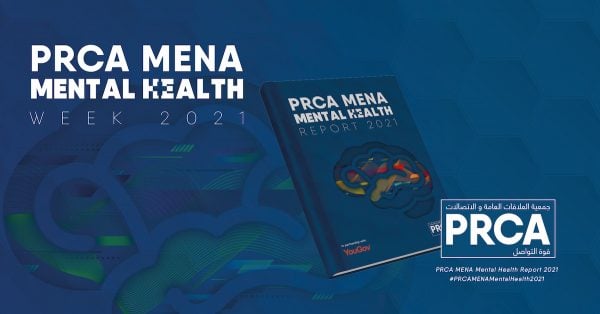
Three in five (57 per cent) PR professionals across the Middle East and North Africa (MENA) region say their organisation is doing ‘not enough’ or ‘much less than what is needed’ to support the mental health of their employees, a major new report shows.
The new Public Relations and Communications Association (PRCA) MENA Mental Health Report, published on World Mental Health Day (Sunday 10 October), finds that 44 per cent of respondents have not had any communication from their employer about mental health in the last 12 months, and that just 15 per cent of practitioners feel ‘completely supported’ by their employer on this issue.
It also finds that 36 per cent of people who faced a mental health problem in the last 12 months did not speak to anyone at their workplace about it – a figure which rises to 41 per cent of women, and dips to 33 per cent among men. However, 79 per cent of those who did confide in a colleague or manager said they were satisfied with the response.
The report provides valuable insights around the wellbeing of the region’s PR and communications workforce, including comparisons on how things have changed since last year’s inaugural Mental Health report.
Other findings in the report, a joint project between PRCA MENA and YouGov, include:
- 42 per cent (in 2020: 41 per cent) of respondents say that the pandemic has worsened their mental health, with 28 per cent saying it has improved it
- 10 per cent (2020: 8 per cent) say that they have had a mental illness in their life, with younger people more likely to have been affected
- Pandemic has also hit profession’s physical health – 17 per cent (2020: 9 per cent) of respondents have had COVID-19, and 21 per cent (2020: 12 per cent) have lost a loved one to the virus
- Increasing numbers of respondents never or rarely find time to exercise (2021: 36 per cent, 2020: 31 per cent), one in four (25 per cent) still struggle to find time to relax
- A large majority (81 per cent) say they would be comfortable talking to a co-worker with a mental health problem
- Many respondents (60 per cent) are likely to speak to a colleague if they experienced a mental health issue in the future
Francis Ingham MPRCA, Director General of the PRCA, said: “It is clear that the mental health impact of Covid-19 is not going away quickly even if we have, I hope, now seen the worst of this pandemic.
“I’m very proud that PRCA members across the MENA region, and indeed around the world, are taking the issue of mental health seriously. I hope that this report will help even more of them to do exactly that.”

Hayley Clements MPRCA, General Manager, PRCA MENA, said: “Since PRCA MENA produced its first Mental Health Report in October last year, I’ve had a number of conversations about the importance of this topic in a profession that is exciting, rewarding and even glamorous at times – but can also, as we all know, be draining and stressful. It’s good to know that the industry is taking the topic seriously.”
The report draws four conclusions, which PRCA MENA hopes will prompt discussion among its members and the wider PR profession in the region. Those conclusions are:
- Covid-19 is a major mental health issue – for better or worse. Even if it has improved some people’s mental health so far, it must be remembered that the pandemic will continue to evolve and to change the way we live and work
- While the report shows that women are less likely to have discussed mental health issues they have experienced with a colleague, there is a relative lack of gender split in the report. This underlines the need to avoid old-fashioned stereotypes around male versus female behaviours and characteristics
- The report suggests that younger demographics are generally more engaged and in touch with mental health issues. But this does not mean that more senior members of the profession do not have mental health needs – the profession should not ignore their needs or assume they are less prone to mental ill-health
- Most respondents say they are willing, in principle, to seek help if they experience mental ill-health. However, there is a substantial gap between what people think someone should do about symptoms of mental ill-health versus what they do in reality
Read the report HERE









